The Global Freedom Project: Imitating the Forest to Transform Haitian Agriculture
September 23, 2024
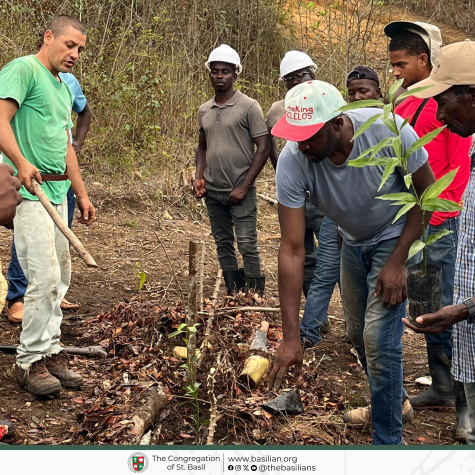
Roger Gietzen’s faith-inspired journey to Haiti began in 2015 with a deep desire to make a lasting difference. In 2017, he had founded the Global Freedom Project (GFP); a nonprofit organization, and recipient of the Basilian Human Development Grant, dedicated to helping Haitian farmers overcome the devastating effects of environmental degradation and unsustainable farming practices.

Roger Gietzen (right) has been working to restore Haitian communities since 2015.
“The attitude of unfair power balance and exploitation continues to shape the country to this day, as it has seeped into the current culture and political government, accepting the misuses of power.” Geitzen explains. “The land has been stripped bare, with less than 2% of its original forest cover remaining.”
Much of Haiti’s ecological damage stems from deforestation and unsustainable farming practices aimed at repaying a crushing national debt. The result has been a loss of fertile topsoil and a landscape ill-suited for agriculture. Recognizing the need for long-term, community-based solutions, Roger’s Global Freedom Project is helping Haitian farmers reclaim their land through a method called syntropic farming—a regenerative technique developed in Brazil that restores the fertility of the soil while producing sustainable crops.
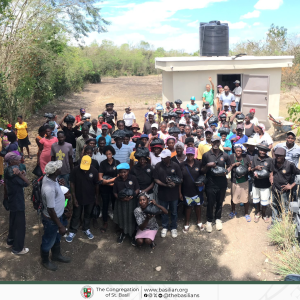
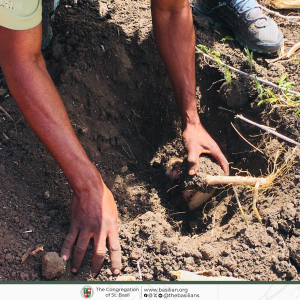
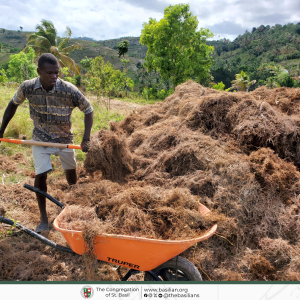
“Syntropic farming captures as much sunlight as possible and mimics natural ecosystems, like those found in a jungle.”
“Syntropic farming captures as much sunlight as possible and mimics natural ecosystems, like those found in a jungle,” Roger explains. The method allows farmers to grow fruit trees, timber, and vegetables together, creating a self-sustaining environment that regenerates the soil and promotes reforestation. “It’s beyond organic because it doesn’t rely on fertilizers,” Roger adds. “Instead, it’s designed to heal the land while providing enough resources for the people to live on.”
The Global Freedom Project’s efforts are driven by a belief in empowering local communities. Roger stresses that real change comes from within. “To make a difference, any initiative or project needs to be sustainable,” he says. “The people need to feel like they are in control of their own lives.” This philosophy is reflected in the GFP’s approach: teaching Haitian farmers new techniques through a peer-to-peer model. Farmers who attend GFP workshops are encouraged to teach their neighbors, creating a network of shared knowledge that spread from those motivated to try and make a change seeing the benefits, and wishing to share it with their communities.
The road to success hasn’t been easy. “When we first started, we had to pay farmers to use their land as demonstration plots to prove that syntropic farming works,” Roger recalls. For the first few years, the project was largely self-funded, with the team committed to proving the method’s effectiveness. “Once the results spoke for themselves, word began to spread.” The system is now well-received by local farmers, but it requires patience. Many farmers are initially skeptical, particularly when faced with unfamiliar techniques like mulching—a key component of syntropic farming that is not part of traditional Haitian practices.


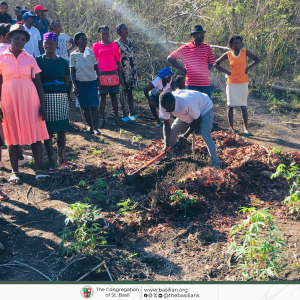
One of the Global Freedom Project’s key strategies has been to create accessible educational resources for the farmers. Roger and his team developed a four-day workshop to introduce the methods and bring in farmers who are serious about changing the way they farm.
One of the Global Freedom Project’s key strategies has been to create accessible educational resources for the farmers. Roger and his team developed a four-day workshop to introduce the methods and bring in farmers who are serious about changing the way they farm. “The farmers come to us because they are motivated. They see the potential in these methods,” Roger explains. The workshops are designed for maximum impact, using simple educational materials to reach farmers who may not be able to read or write.
Beyond the workshops, the GFP envisions broader community collaboration. Once the initial farmers are trained and begin to see results, the idea is for the knowledge to spread organically throughout the farming community. “The goal is to have farmers teaching each other, creating a shared commitment to a more sustainable future.” Roger says. As more farmers adopt syntropic farming, the project hopes to form cooperatives that will harmonize their efforts and grow high-value crops, such as cocoa, to generate income.
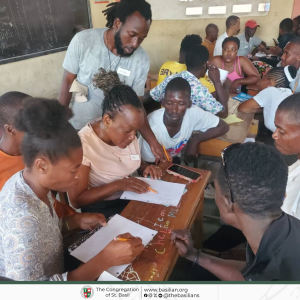
The project’s impact goes beyond simply increasing agricultural yields. By reintroducing sustainable farming practices, Roger hopes to restore not just the land but also the livelihoods of Haiti’s rural poor. “Most projects in Haiti deliver short-term results,” Roger explains. “But ours is about long-term community building. It takes longer to take off, but once it does, the results are exponential.”
Fr. David Sharp CSB, has witnessed Roger’s dedication firsthand. “Roger’s work has been very successful in helping to lift people from extreme poverty and bringing justice to a very difficult situation for Haitian farmers,” Fr. Sharp said. The Basilians, having known Roger’s family for years, are proud to support his efforts. “The goals of this project align with our mission to promote peace and justice, providing practical solutions to combat the severe poverty in rural Haiti.”
Looking ahead, the Global Freedom Project will continue to expand its efforts in Haiti. Through education, collaboration, and a commitment to sustainability, the Global Freedom Project is helping Haiti’s farmers reclaim their land and their future.
Categories
Discerning, a Vocations BlogGeneral News
Stirrings
Uncategorized
New Basilian Associates Begin Their Journey
From left to right: Diego Alejandro Martínez López, José de Jesús Rodríguez Pérez, CSB, José Yonni Villa de Jesús, José Juan Téllez Hernández We joyfully celebrated the Incorporation of three […]
Read MoreSt. Basil’s Parish Celebrates 169th Founding Anniversary
This past weekend we celebrated 169 years since St. Basil’s Parish first opened its doors in Toronto. Since then, countless generations have gathered here to pray, celebrate, and grow in […]
Read MoreSt. Thomas Begins Year with Holy Spirit Mass
As the University of St. Thomas begins a new academic year, the campus community gathered for the Mass of the Holy Spirit — a cherished tradition that invites God’s guidance, […]
Read MoreBasilians Begin New Ministry in Houma-Thibodaux
This week, our Superior General visited the Diocese of Houma-Thibodaux, where Basilians Fr. Osman de la Hoz and Fr. Jose Alberto Juarez are serving the growing Hispanic community with dedication […]
Read MoreFr. George Smith Blesses New Student Center
Fr. George Smith, CSB blessed the new center in the Lavery Library, marking a significant milestone in St. John Fisher University’s commitment to academic excellence and student support. The center […]
Read More